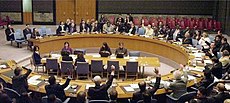United Nations Security Council Resolution 1718
| UN Security Council Resolution 1718 |
|
|---|---|

The Security Council votes in favour of Resolution 1718
|
|
| Date | 14 October 2006 |
| Meeting no. | 5,551 |
| Code | S/RES/1718 (Document) |
| Subject | Non-proliferation Democratic People's Republic of Korea |
|
Voting summary
|
15 voted for None voted against None abstained |
| Result | Adopted |
| Security Council composition | |
|
Permanent members
|
|
|
Non-permanent members
|
|
United Nations Security Council Resolution 1718 was adopted unanimously by the United Nations Security Council on October 14, 2006. The resolution, passed under Chapter VII, Article 41, of the UN Charter, imposes a series of economic and commercial sanctions on the Democratic People's Republic of Korea (the DPRK, or North Korea) in the aftermath of that nation's claimed nuclear test of October 9, 2006.
UNSCR 1718 banned a range of imports and exports to North Korea and imposed an asset freeze and travel ban on persons involved in the country’s nuclear program. This trade ban included “battle tanks, armoured combat vehicles, large caliber artillery systems, combat aircraft, attack helicopters, warships, missiles or missile systems.” The resolution also prohibited imports of luxury goods to the country. Large-scale arms, nuclear technology, and related training on nuclear weapons development were prohibited from being provided to North Korea. All states were to cooperate in inspecting cargo suspected of trafficking nuclear, chemical, or biological weapons into the country. In practice, not all states supported this and China, an ally of North Korea, did not inspect cargo to and from the country and continued to support the North Korean regime. Sanctions limiting trade and instituting travel bans also were included. Stipulations required states to freeze the assets of individuals suspected of being involved with North Korea’s nuclear program. Special provisions were included that allowed money transfers and travel ban exemptions for humanitarian purposes to be reviewed on a case-by-case basis.
The resolution's provisions include:
The resolution established a committee to gather more information, specify the sanctions, monitor them, and issue recommendations. Subsequently in 2009 a Panel of Experts was established in support of this Committee.
While the resolution does invoke Chapter VII of the United Nations Charter which allows for enforcement, it does not provide for any use of military force to back up these demands. The UN Security Council had earlier determined to present a united front on this resolution in order to make clear to Pyongyang its condemnation of the reclusive nation's nuclear aspirations, but there remain differences of opinion about the implementation of the resolution. Both China and Russia are concerned about how cargo inspections could provoke confrontations with the North Korean Navy, and China declared after passage of the resolution that it will not perform such inspections. The United States compromised on its initial desire to block all imports of military equipment. The final vote on the sanction was delayed by the attempts to change the wording.
...
Wikipedia
